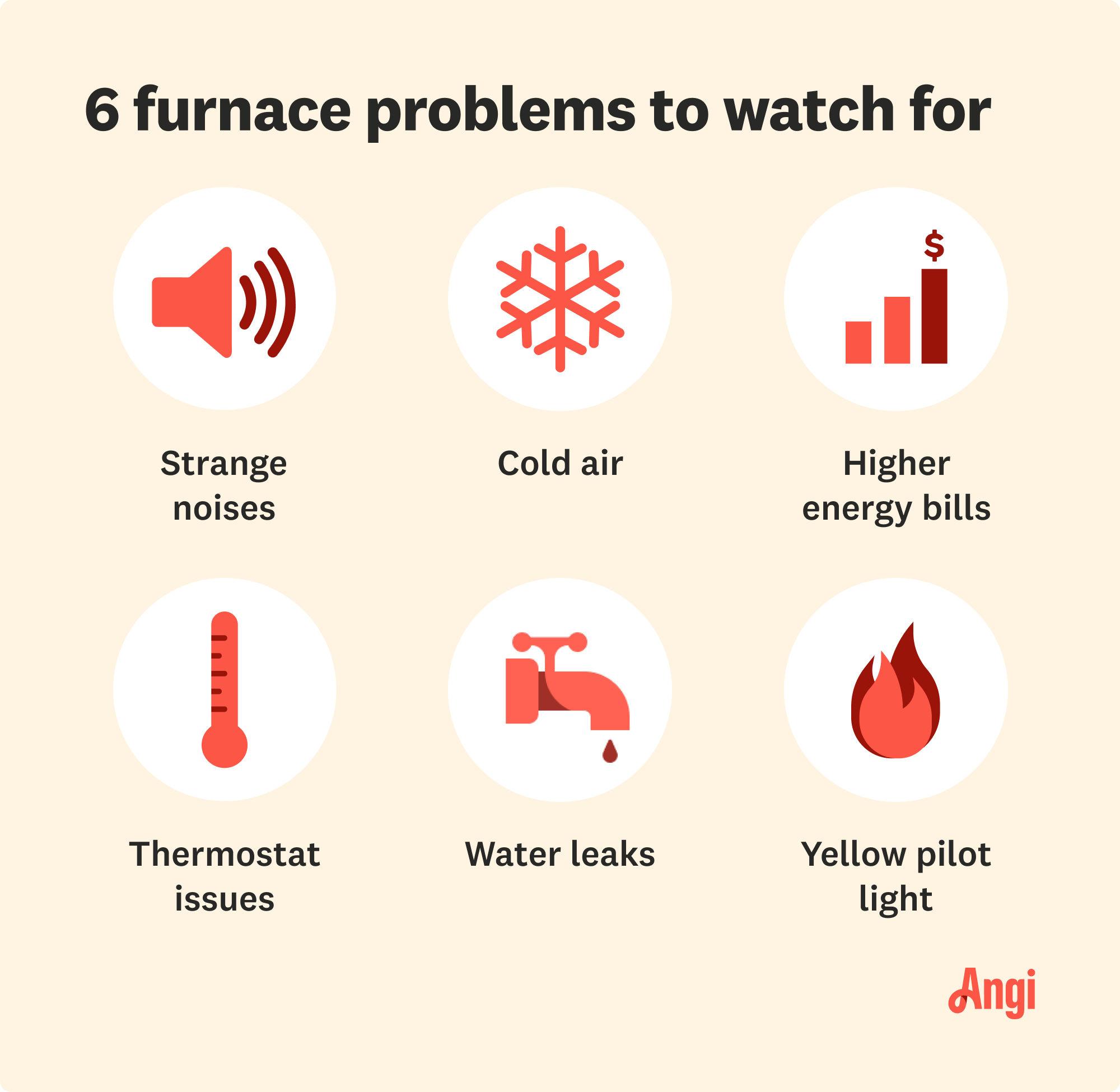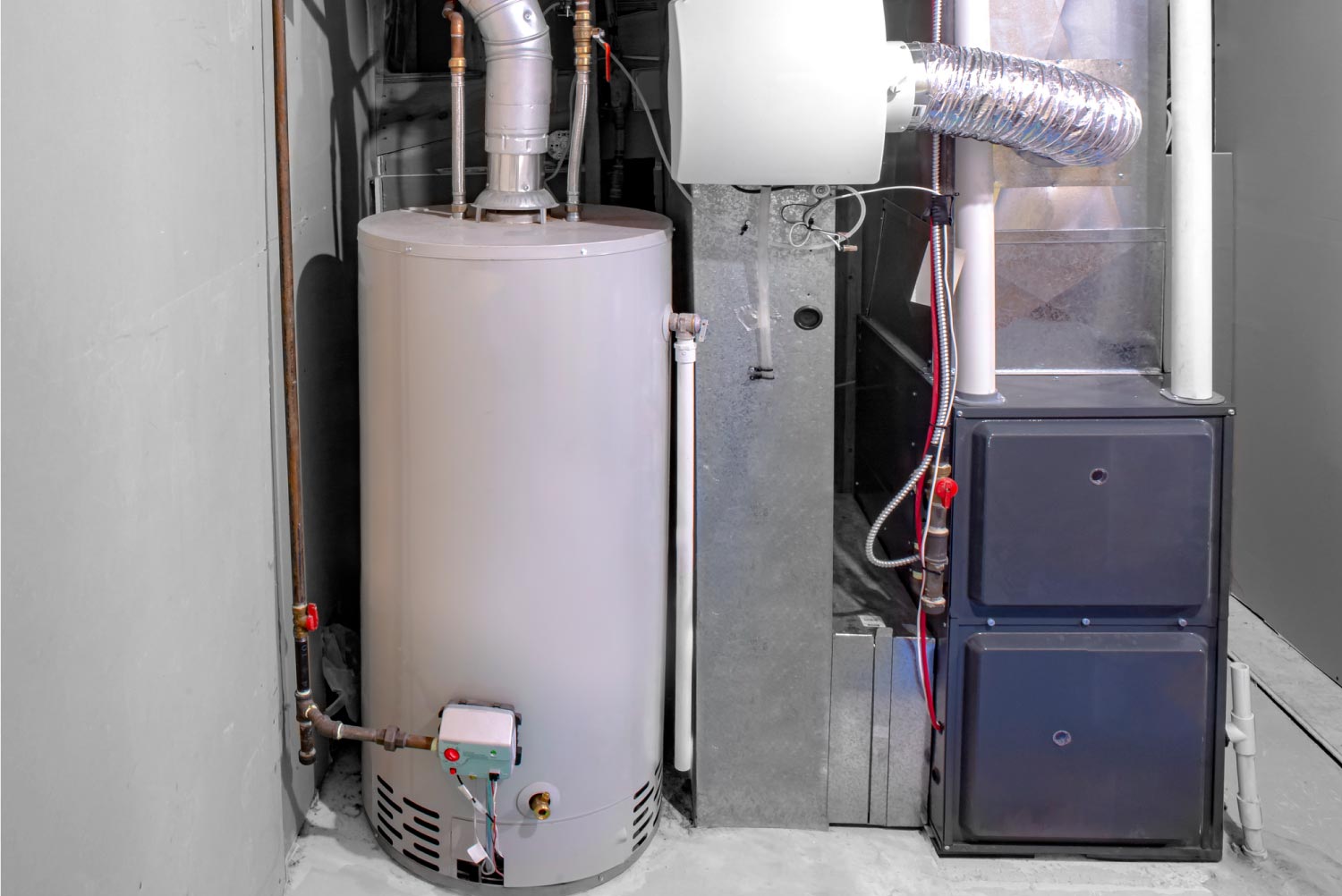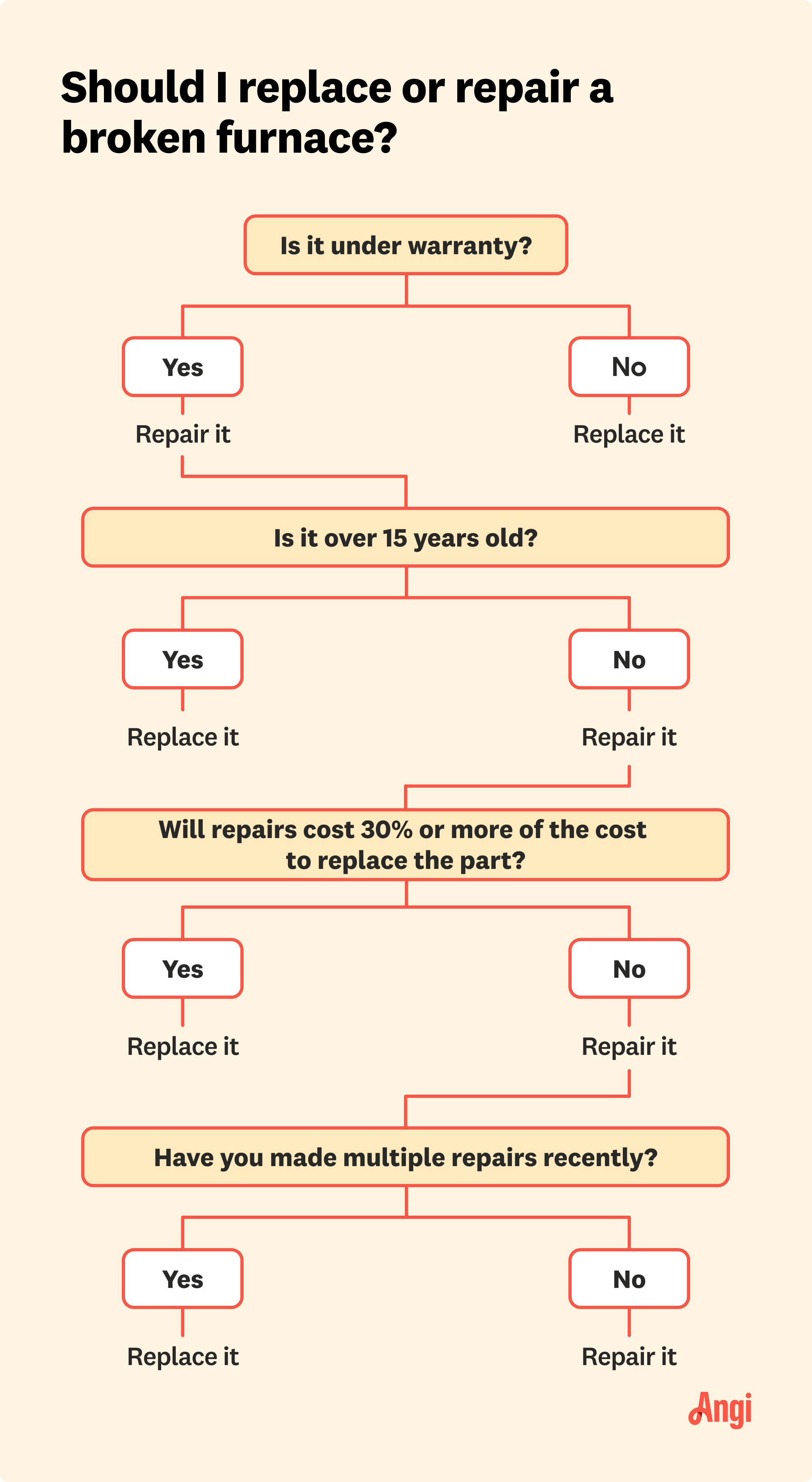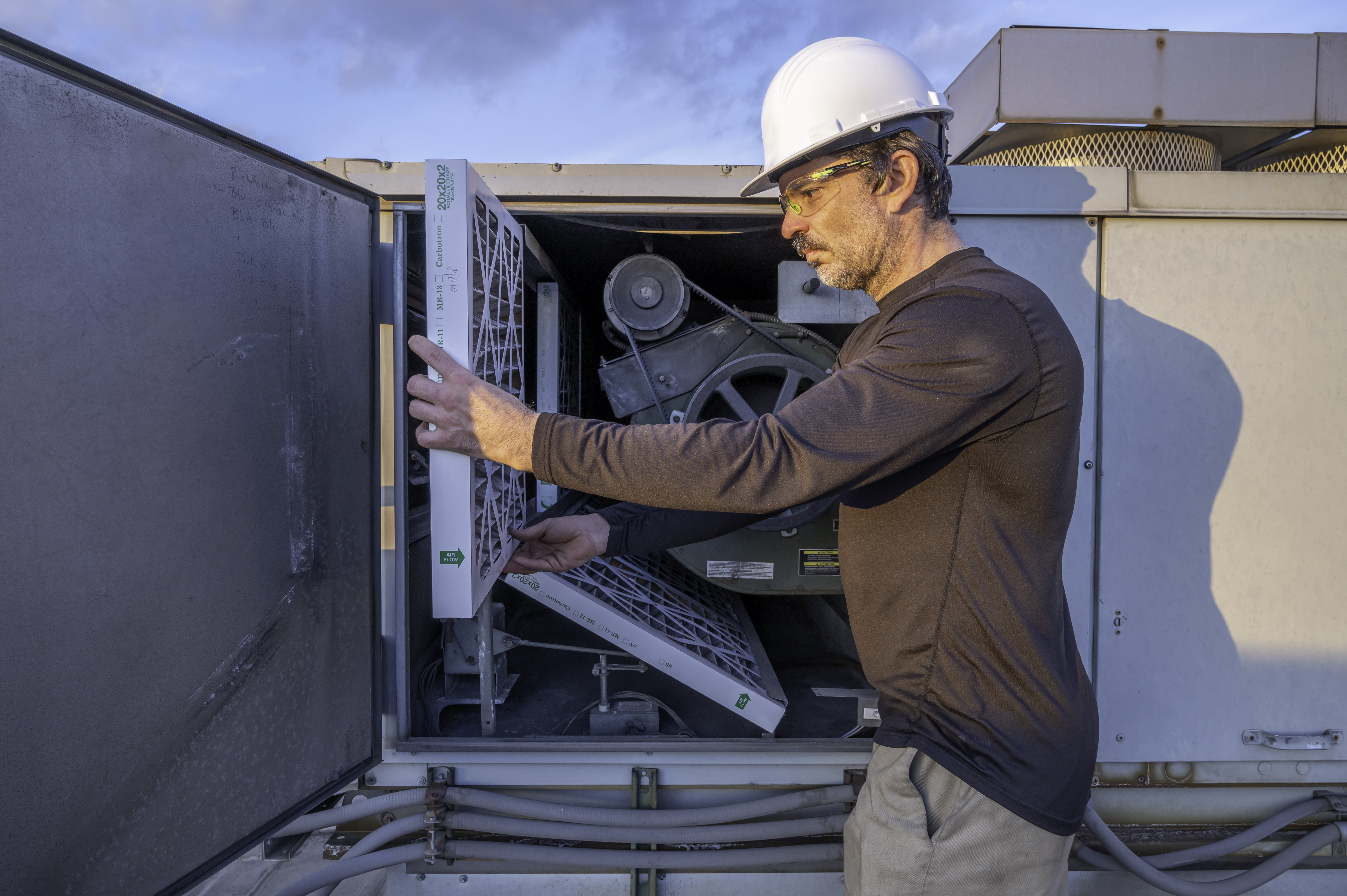
Whole-house humidifier costs vary based on the type and size of the unit, along with other factors. The price might be worth it for people living in dry regions.
Repairing is less expensive upfront, but replacing your furnace might save over time
The decision of whether to repair or replace your malfunctioning furnace can save you a few thousand dollars if considered carefully.
Furnaces that are over 15 years old, are spiking your energy bills, or are showing signs of potential danger to your home should be replaced.
Newer furnaces may be repaired, especially if the issues are linked to ductwork problems or a broken thermostat within the home.
An old, inefficient, banging furnace means it’s time to replace it—at least, most of the time. So, do you repair or replace your furnace?
If you own your home long enough, you’ll probably have to replace your HVAC system to keep things comfy. Fortunately, furnaces are designed to last 15 to 30 years when maintained well, and you can implement a few fixes during those years to hold onto your system as long as possible.
But knowing when to spring for a whole new furnace and when you can get away with going the repair route can be tricky. Luckily, a few considerations can help you make an informed decision.
There’s no denying that the cost to install a new furnace isn’t cheap. On average, you should expect to pay $5,500, which is the average cost for a new furnace. That’s why taking a moment to see if you should repair or replace your furnace is important, even if yours goes down during the cold winter months.
The most common furnace issues that may require repair or replacement, depending on the type of furnace you have, include the following:
Blown motor
Broken thermostat
Uneven heating or cooling
Clogged or dirty filters
Cracked heat exchanger
Overcycling
Switch malfunctions
While a simple repair or some quick maintenance can solve many of these issues, some situations might necessitate total replacement, especially if it’s just one of many furnace issues. Knowing when to call for HVAC service and whom to call when your furnace goes out is important, even if it means tossing on an extra sweatshirt for a couple of hours while you await help. There are, however, some circumstances that merit emergency action and immediate furnace replacement.

Here are six situations where you should probably consider springing for a total furnace replacement.
If you suspect your furnace is leaking carbon monoxide—or your CO detector is going off, and you’re not sure why—leave your home immediately. Once you’ve evacuated, call the fire department and wait for their directions. Only after that should you start looking into hiring a local HVAC pro to install a new furnace.
Carbon monoxide (CO) is a toxic, odorless, clear gas that can make you sick or even result in fatalities. The only way to tell for certain that your furnace is producing CO is to use a CO detector, but you may also notice yellow flames in your furnace as a sign of an issue. If the burner produces CO, you should replace it to keep you and your family safe.
Install carbon monoxide alarms on every level of your home, in central locations, and outside bedrooms. Check all of your carbon monoxide detectors every month, and replace the batteries on a set schedule according to the manufacturer’s instructions.
Making repairs over the years keeps your HVAC system running properly and efficiently. But even a pristine maintenance schedule won’t keep your furnace going forever.
Consider 15 years a good cutoff when deciding if you’ll replace or repair a furnace. If your furnace is older than that, it’s likely time to replace your unit instead of investing hundreds or thousands of more dollars into repairs.
If your furnace is running perfectly at the 15-year mark, you can wait until it goes down to replace, or you can preemptively repair it to avoid being without heat and potentially putting yourself in an emergency situation.
Popping, banging, screeching, rattling, and squealing noises aren’t only loud and distracting—they’re also a sign that your unit could be overheating, which causes metal to expand or grind against objects inside.
That said, if your unit is still pretty new (less than 10 years old) and you hear these noises, dirt could be an issue. A local furnace repair technician can clean your system and replace filters to address the problem. If it’s older than that, you might be due for a replacement.
Do not ignore unusual odors, strange loud noises, or performance issues with your heating system. These can be indicative of serious problems. If you ever experience these, turn off your system and call a professional immediately.
At a certain point, you may need to cut your losses and just opt for a replacement. Certain repairs (especially beyond the 10- to 15-year mark) aren’t worth pouring money into (unless, of course, buying a new furnace doesn’t fit your budget at the moment).
The cost to replace a blown furnace motor, for example, could be up to $900. Use roughly 30%, or around $1,500 to $2,000 in repairs, as a benchmark for determining whether you should repair or replace your device. Ask local vendors for a quote to find a deal that works for you.
One frustrating outcome of a poorly functioning furnace is uneven heating. Some rooms might be sweltering while others are frozen.
If this is a persistent problem, it may be time to replace your unit. However, be sure to read the reasons to repair your furnace below if this is your device’s only issue. Sometimes, uneven heating could have to do with other (more affordable to repair) components of your HVAC system. If you find something as simple as a closed damper causing the issue, you could save yourself thousands by fixing the issue rather than replacing your furnace.
An older or less-efficient furnace may cause your heating or cooling costs to creep up by tens or even hundreds of dollars per month. This cost can be justifiable for a season or two, especially if your device is pretty new.
However, a sudden spike of several hundred or even thousand dollars per year should give you a reason to consider replacing it. At the very least, call a furnace repair company near you to get a professional opinion.
On the other hand, here are some scenarios where repairing your furnace makes more sense than replacing the entire unit.
| Try to Repair | Consider Replacing |
|---|---|
| It’s under 10 years old | It’s 15 years or older |
| Isolated issues | Recurring problems |
| You’re moving soon | You have years to spend in your home |
| You have a service contract | You pay out of pocket for HVAC repairs |
| Comfort issues, like cold spots | Safety issues, like CO production |
Are you thinking about selling? In terms of sunken costs, it may make sense to preserve your furnace if it still has life in it. Sinking a couple of hundred dollars into your HVAC system as a stopgap solution—hopefully, one that buys it another two or three years of life—might save you thousands instead of buying a new furnace. Just keep in mind that a buyer may see more value in a new furnace, so a replacement could help your home sell more quickly.
Slight increases to your energy bill don’t always justify or necessitate a furnace replacement. Be sure to read through your maintenance guide and carry out its suggestions, such as replacing the filters on a regular basis. This action is one of the simplest and best furnace maintenance tips you can follow (for all home appliances, really). Drastic increases that don’t drop back down with proper maintenance could warrant a replacement.
A broken thermostat may be the reason your home won’t heat or cool. It’s quite common, and if it’s indeed broken or the battery is dead, there’s probably nothing wrong with the furnace itself.
Some more good news: thermostat repair, one of the most common furnace repairs, may cost you as little as $20 to fix. That’s far less than the $5,500 you might spend on a new furnace.
There are other related issues that could be the culprit, like if you turned off a radiator or closed a damper in your duct work by accident. Check these issues first before doing any repairs.
Your furnace, heat exchange system, vents, and ductwork all make up your home’s HVAC system. Sometimes, banging, screeching, or other loud noises have to do with loose or damaged ductwork instead of your furnace.
Purchasing a vent insulation cover (between $1 and $2 per square foot) is an affordable solution that might solve the problem. Having a professional inspect your vents and ductwork and make any adjustments is also a solid plan B option instead of replacement.
Another benefit to going this route over replacing your furnace is that the duct inspection could expose leaks in your HVAC ducts, and fixing them in the process could save you on your heating and cooling bills by making your home more energy-efficient.

So, should you replace or repair your furnace?
Replacing your furnace usually makes sense when repairs exceed $2,000, your unit is 10 years or older, your energy bills are through the roof, or it’s making loud, scary noises constantly.
If you even slightly suspect carbon monoxide is emitting out of your device, evacuate your home immediately and worry about this furnace repair versus replace debate later.
On the other hand, repairing your furnace is probably the better option when minor repairs, such as ductwork tightening, noise reduction, or a broken thermostat, are the culprit. A simple repair like bleeding your furnace could cost you far less than a replacement and still fix your issue.

From average costs to expert advice, get all the answers you need to get your job done.

Whole-house humidifier costs vary based on the type and size of the unit, along with other factors. The price might be worth it for people living in dry regions.

Do you know what it will cost to reroute ductwork in your home? Discover the cost factors and other considerations of this HVAC project.

What you’ll pay in Columbus, OH, for furnace repairs depends on many factors. Here’s a breakdown of what can go wrong and the cost to fix those issues.

Wondering who to hire for swamp cooler installation? Learn when to call an HVAC contractor, electrician, or handyperson, and what to expect.

Not sure which kind of thermostat is best for your home? Here’s an overview of three types of thermostats so that you can choose the right one for you.

Learning how to secure a window AC unit will avoid personal injury and damage to your home. It will also protect against theft and break-ins.